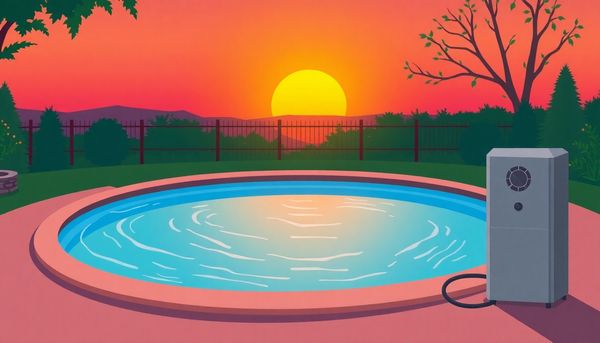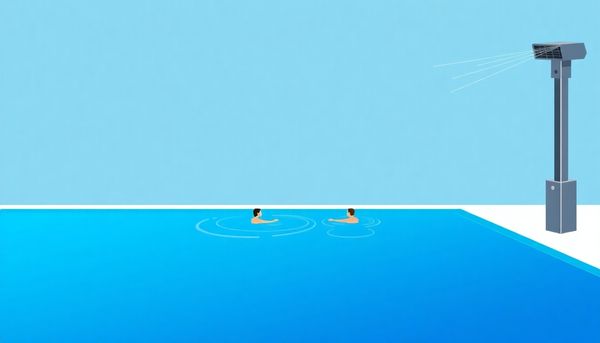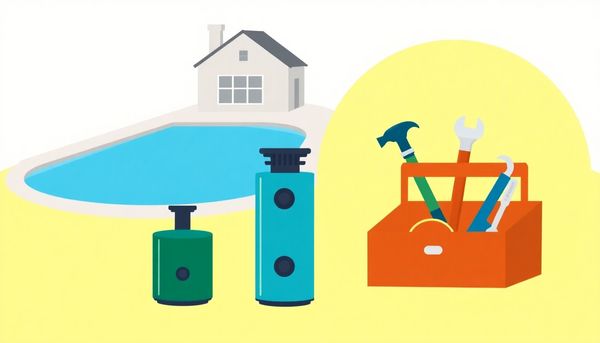On a crisp autumn evening, as the sun dips below the horizon, the allure of a warm, inviting pool becomes irresistible. The gentle steam rising from the water seems to whisper promises of relaxation and rejuvenation. Yet, achieving this cozy aquatic retreat requires the right equipment—specifically, a reliable gas pool heater. In 2024, the debate between propane and natural gas heaters remains a hot topic among pool owners, each option offering its own set of advantages.
Choosing the best gas pool heater involves more than just picking a brand off the shelf. It's akin to finding the perfect balance between efficiency, cost, and environmental impact. Propane heaters, for instance, are lauded for their quick heating ability, making them ideal for spontaneous swimmers or those with weekend retreats. On the other hand, natural gas heaters often win praise for their cost-effectiveness and consistent energy supply, especially in areas with established gas lines.
Having experienced the dilemma firsthand, I recall the struggle of deciding between the two for my own backyard sanctuary. After countless reviews and comparisons, I opted for a natural gas heater, charmed by its long-term savings and seamless integration with my existing utilities. Whether you're looking for swift warmth or economical maintenance, understanding these nuances can guide you toward the perfect pool heater, ensuring that your swimming season lasts as long as you desire.
Discover Top Gas-Pool Heaters

Selecting the ideal gas pool heater often feels like finding the perfect puzzle piece—everything needs to fit just right. From climate conditions to pool size, multiple factors influence the decision. Consider the Pentair MasterTemp 125, especially if you have a smaller or above ground pool. Its compact design and efficient heating capacity up to 15,000 gallons make it a hit for budget-conscious pool owners. Moreover, its user-friendly interface with clear indicator lights ensures seamless operation, while its low NOx certification underscores environmental consideration.
On the other hand, larger pools or those in colder climates may benefit from the robust offerings of the Raypak Gas Heater. With a BTU range from 206,000 to 399,000, this model caters to both above-ground and inground pools. The digital control panel makes setting and monitoring temperatures straightforward, ensuring that your pool stays inviting all season long. Raypak's corrosion-resistant design also guarantees longevity, reducing the frequency of maintenance headaches.
For those considering propane, the Hayward Universal H-Series stands out. It delivers powerful performance with options up to 400,000 BTU and meets low NOx emission standards, making it both effective and eco-friendly. Remember, the choice between natural gas and propane often boils down to availability and cost. Natural gas generally offers a more economical solution, but propane's energy density can be advantageous for certain scenarios. Whichever path you choose, ensure it aligns with your unique pool needs and usage expectations.
Choose the Right Fuel-Type
Choosing the right fuel type for your pool heater can significantly impact not only your swimming experience but also your wallet. Remember the time when I opted for a propane heater because it was easily available? I soon realized the costs were spiraling higher than I had anticipated. You see, while propane offers the advantage of being delivered in tanks, providing flexibility in areas without gas lines, it comes at a higher operational cost. That's because propane is generally more expensive than natural gas, albeit yielding more energy per unit.
On the flip side, natural gas heaters are a blessing for those who have access to gas lines. They're usually cheaper to run and you don't have to worry about tank refills. However, installation might demand a bit more effort if you need to lay down new gas lines. But once set up, these heaters can quickly warm up your pool without the constant worry of fuel depletion.
Assessing the specific needs of your pool is crucial. A smaller above-ground pool might do well with a propane heater if fuel costs are manageable, while a larger in-ground pool could benefit from the consistent supply and lower cost of natural gas. At the end of the day, your decision should hinge on availability, cost, and your personal usage patterns.
Simplify Installation Process
Embarking on the journey to install a gas pool heater can initially seem daunting, especially given the various considerations like gas availability and pool compatibility. Yet, simplifying the installation process is entirely achievable with a bit of foresight and planning. First off, understanding whether your pool will benefit more from natural gas or propane is crucial. Natural gas heaters often require a pre-existing gas line, which might necessitate additional groundwork if absent. On the flip side, propane heaters utilize tanks that can be conveniently located, though they might incur higher operational costs.
Navigating the installation path becomes smoother when you consult a professional installer. They ensure the seamless integration of your heater with existing plumbing and electrical systems, a task best left to experts given the intricacies involved. This professional touch not only guarantees safety but also optimizes the heater's performance, aligning it perfectly with your pool's specifications.
A personal touch: When I installed my pool heater, hiring an expert significantly cut down the hassles, saving me both time and potential headaches. It also left me confident that everything was set up to maximize efficiency and longevity. Lastly, don’t overlook additional aspects like choosing a suitable location that accommodates maintenance access and provides protection from the elements. By adhering to these guidelines, the task of installing a gas pool heater becomes not just manageable, but a stepping stone to enjoying a perfectly heated pool throughout the seasons.
Maximize Heating Efficiency
Efficient use of energy is not just a buzzword; it’s a smart way to keep those pool heating bills in check while ensuring your backyard oasis is always ready for a swim. Selecting the ideal gas pool heater is only the beginning. Transforming that choice into a powerhouse of efficiency requires a blend of savvy maintenance and strategic usage.
Start by considering the placement of your heater. Positioning it close to the pool reduces heat loss in transit, allowing you to maximize power without extra energy expenditure. Next, a pool cover is your best ally. It might seem like a simple sheet, but it plays a significant role in minimizing heat evaporation, especially overnight or on cooler days. By keeping the warmth contained, your heater won’t need to work overtime.
Regular maintenance is not just a chore, it’s a necessity. A well-maintained heater runs smoother and uses less fuel. Think of it like keeping your car tuned up; a little attention goes a long way. Schedule bi-annual professional inspections if you use your pool year-round, ensuring everything from gas lines to electronic systems are in tip-top shape.
Finally, be mindful of the climate. Adjust your heater’s usage as the seasons change. In warmer months, dialing back the heat can save a surprising amount of energy. By balancing these practices, you ensure that your pool remains a joy rather than a financial drain, letting you make the most of those sunny swim days.
Fueling your pool heater is a decision that ripples through your budget and swimming experience. Natural gas and propane each have their own merits, and the choice largely hinges on availability and cost-effectiveness. Natural gas often emerges as the front-runner due to its lower cost. It's delivered through existing gas lines, ensuring a seamless supply without the hassle of refills. However, this convenience presupposes that your property is already equipped with gas lines, which aren’t always present in every neighborhood.
On the other hand, propane offers flexibility where natural gas lines are unavailable. Propane's portable tanks mean you can install a heater practically anywhere. Though more energy-dense, propane typically carries a heftier price tag for ongoing use. Still, for some, the independence it brings is worth the extra expense.
When I installed my pool heater, I found natural gas the ideal choice; it tapped directly into our home's supply, saving me from the ritual of monitoring fuel levels. A friend, however, chose propane due to its high energy output and the lack of natural gas infrastructure in her area.
Ultimately, the right decision boils down to a balance between cost, accessibility, and personal preference. Whether you opt for natural gas or propane, ensure your choice aligns with your pool's needs and your budget, setting the stage for many comfortable swims ahead.
Assess Pool Size and Climate
Choosing the perfect gas heater for your pool isn't just about picking a brand with a shiny reputation. It's a delicate balance that hinges on understanding your pool's size and the climate it resides in. A compact backyard oasis demands an entirely different heating approach than a sprawling aquatic retreat. In colder climates, where icy winds can nip at the water’s surface, a high-capacity heater becomes indispensable, powering through frigid conditions to maintain a cozy swim. On the other hand, if you’re blessed with a milder climate, a modest heater might suffice, conserving energy and keeping costs in check.
Let me share a bit from my own experience. A friend of mine, living in the sunny South, installed a hefty heater only to discover it was overkill—most days, the sun did half the work. Conversely, another acquaintance in the chilly North found that their underpowered unit struggled, leaving them shivering on brisk mornings. So, it's essential to tailor your heater choice to your specific geographic conditions.
Lastly, consider how frequently you swim. Extending your swim season beyond summer might necessitate a more robust system, especially if you aim for a New Year’s splash. Matching your heater's BTU rating to your pool size and anticipated usage ensures that every swim is warm and inviting, regardless of the season.
Evaluate Installation Requirements
Navigating the landscape of gas pool heaters requires more than just picking the most powerful model you can find. It’s about ensuring that the heater you choose aligns perfectly with your unique setup and needs. The first step in this process is to scrutinize your installation requirements. Should your poolside dreams feature a natural gas heater, the availability of existing gas lines on your property becomes crucial. Without these, you might face significant additional costs to have them installed. Alternatively, a propane heater could be your answer, although it demands regular tank refills and tends to be pricier in operation.
Space is yet another factor worth considering. Pool heaters, whether installed next to your pool or sequestered in a shed, need ample room to breathe, both for efficient operation and safety. This space also needs to accommodate connections to your pool’s pump and filtration system, as well as a power source. An often-overlooked detail, the spatial footprint of the heater can dictate where and how it’s installed, potentially saving or costing more in groundwork adjustments.
Finally, while the DIY spirit is admirable, gas heaters demand professional installation. Their intricate mix of gas and electrical hookups makes them complex beasts best tamed by seasoned experts. A certified installer not only ensures safety and compliance but might also save you potential headaches down the road. Thus, taking time to evaluate your specific installation requirements is an investment in both performance and peace of mind.
Compare Fuel Efficiency and Cost
Evaluating the fuel efficiency and cost of gas pool heaters is akin to balancing a seesaw: it's all about finding that perfect equilibrium between upfront expenses and long-term savings. Gas heaters, whether fueled by natural gas or propane, offer a quick solution to warm your pool, but their efficiency and cost can vary significantly. Natural gas heaters tend to be the more economical choice, especially if you already have a gas line. While the initial setup might sound daunting (and your property may require a bit of adjustment), the running costs are typically lower. This means more savings in your pocket over time, particularly for those who enjoy frequent swims.
On the flip side, propane heaters are often the go-to when natural gas isn't accessible. Offering more energy per unit, they might heat your pool faster, but this comes at a steeper price. The cost of propane can fluctuate, potentially sending your monthly heating bill soaring, especially in colder months or extended swim seasons.
When deciding between the two, consider not only the immediate fuel costs but also the long-term impact on your wallet. A larger pool, for instance, demands a higher BTU output, which can tip the scales in favor of a more fuel-efficient option. Understanding your local energy prices and pool usage patterns will guide you to the most cost-effective and efficient choice for your aquatic haven.
Simplify Pool-Heating Decisions

Navigating the world of pool heaters can feel like learning a new language. With so many factors like pool size, climate, and gas types, decisions can quickly become overwhelming. Yet, making the right choice ensures you enjoy your pool throughout the year without breaking the bank. Begin by assessing your pool’s needs. For smaller setups or above-ground pools, the Pentair MasterTemp 125 shines with its compact design and efficiency. It’s budget-friendly and delivers warmth without excessive power consumption, making it ideal for pools up to 15,000 gallons.
Next, consider your gas options. Natural gas heaters, like the Raypak model, are preferred if you have a gas line already in place. These heaters offer steady performance and can be a cost-effective choice in areas where natural gas prices are low. However, if installing a gas line is impractical, propane heaters might be your best bet. Although pricier to operate, propane is more energy-dense, providing substantial heating power.
Installation and operational ease are also crucial. Gas heaters require professional installation due to their need for electrical and gas connections. Once set up, look for features like digital controls or automatic ignition systems that simplify temperature management.
Ultimately, selecting the right heater involves balancing upfront costs with long-term savings and convenience. By understanding your priorities and constraints, you can choose a gas pool heater that keeps your swimming season going strong, all while respecting your budget and environmental footprint.
Select the Right Fuel-Type
Choosing the right fuel type for your gas pool heater can seem like navigating a maze. It’s more than just flipping a coin between natural gas and propane; it involves weighing factors like energy efficiency, availability, and cost-effectiveness. For instance, imagine living in a suburban area where natural gas lines conveniently snake through your neighborhood. Here, a natural gas heater shines as a cost-saving champ, delivering steady energy without the need for bulky storage tanks. Not only is it typically cheaper per month, but you'll also never face the hassle of refilling a propane tank during a chilly swim season.
On the flip side, rural dwellers might find themselves leaning toward propane, especially when natural gas lines are scarce. Though propane can be pricier, its higher energy density means you get more heat per gallon—crucial for those who want to extend their swim season into the cooler months. Plus, propane heaters can be the perfect fit for those who value portability or have an aesthetic that tank storage won’t disrupt.
Ultimately, your choice hinges on a delicate balance of local utility infrastructure, personal priorities, and long-term budget considerations. Whether prioritizing upfront savings or operational efficiency, understanding these nuances will tailor your pool heating experience to perfection. Whatever the decision, remember that the right fuel type is an investment ensuring warm, inviting waters whenever you crave a swim.
Evaluate Heater Installation Requirements
Deciding on the perfect gas heater for your pool isn't just about picking the most powerful model. It's a bit like fitting pieces of a puzzle together—each element must align perfectly to create the ideal swimming environment. First up, evaluate your pool's size and the local climate. A massive heater with high BTUs might seem appealing, but for a compact pool in a temperate area, it's akin to using a sledgehammer to crack a nut.
When considering fuel type, weigh the pros and cons of natural gas versus propane. Natural gas requires a stable connection to a gas line, which is a breeze if you already have one but can be a costly endeavor if not. Propane, on the other hand, involves regular refills and storage considerations. Each option carries its own set of installation nuances—natural gas may save money in the long haul, but propane can be quicker to set up if infrastructure is lacking.
The physical installation is another crucial detail. Placing your heater in the right spot is essential for optimal performance and safety. You'll need enough space near your pump and filtration system, and the unit has to be shielded from the elements. Don’t underestimate the complexity of the task; enlisting a professional ensures all connections—both gas and electrical—are up to code, sparing you headaches down the road. In the grand scheme of pool ownership, these considerations help ensure your investment is both wise and enduring.
Maximize Energy Efficiency
When it comes to keeping your energy bills manageable while enjoying a warm swim, a few smart strategies can make a world of difference. Choosing a gas pool heater with energy efficiency features is a great start. Modern models, like the Raypak and Hayward heaters, come equipped with advanced technologies designed to conserve fuel. Look for heaters with low NOx emissions, which not only keep the environment cleaner but also often translate to better fuel efficiency.
In addition to choosing the right heater, consider the impact of your pool's surroundings. A simple step like using a solar cover when the pool isn’t in use can significantly cut down on heat loss. This prevents your heater from working overtime, saving both energy and money. In my own backyard pool experience, investing in a good cover reduced my heating costs by nearly 20% during the cooler months.
Regular maintenance also plays a crucial role in efficiency. A well-maintained heater operates more smoothly, consuming less fuel. Ensure your pool’s water chemistry is balanced, as unbalanced water can lead to scaling, which decreases efficiency. A friend once shared how neglecting this aspect led to increased gas consumption, something easily avoidable with routine checks.
Finally, timing matters: running your heater during off-peak hours can help avoid the higher costs associated with peak energy usage periods. With these thoughtful practices, you’ll not only maximize energy efficiency but also enjoy a longer swim season without breaking the bank.
Maximize Pool Season with Gas

As the days grow longer and the sun hangs high, there's nothing quite like a dip in a perfectly heated pool. To truly make the most of the pool season, choosing the right gas heater can transform chilly waters into a warm, inviting oasis. Whether you opt for natural gas or propane, each has its distinct advantages that cater to different needs and circumstances.
Natural gas heaters are a dream for those with access to existing gas lines. This option offers a more consistent and cost-effective solution in the long run, as natural gas generally costs significantly less than propane. If your property already accommodates a gas line, you're in luck—installation becomes a breeze and operational costs shrink. On the other hand, propane is your go-to if flexibility is key. For homes lacking a gas line, a propane heater stands as an independent powerhouse, capable of delivering intense heat without the infrastructure of a natural gas setup.
Beyond the type of fuel, consider the heater's adaptability to both above ground and inground pools. Compact options like the Pentair MasterTemp 125 are ideal for smaller pools, ensuring energy efficiency and affordability without compromising on performance. Conversely, larger pools may benefit from robust models such as the Raypak or Hayward series, which can tackle even the largest volumes of water with ease.
Maximizing your pool season is about more than just heat—it's about convenience, cost-efficiency, and finding a solution tailored to your lifestyle. With the right gas heater, every swim can be as delightful as the first, extending your enjoyment well beyond the typical summer months.
Choose the Right Gas Heater
Selecting the perfect gas heater for your pool can feel like piecing together a puzzle. Each pool is unique, requiring a tailored approach that considers a variety of factors. Start by evaluating your pool's size and the climate you live in. For example, if you're in a cooler region, a powerful heater is essential to extend your swimming season. Conversely, smaller pools in warmer climates can get away with less robust models.
Consider the type of gas available in your area. Natural gas heaters are often more cost-effective in the long run, thanks to lower fuel costs. However, if your property lacks gas lines, a propane heater might be your best bet. Keep in mind, though, propane can become pricey due to its energy density and delivery logistics.
Installation ease and compatibility with your pool type should not be overlooked. Whether you're heating an above-ground oasis or an inground retreat, ensure the heater you choose is designed for your setup. For instance, the Pentair MasterTemp 125 is ideal for above-ground pools, while the Raypak heater is versatile enough for both pool types. Lastly, don't skimp on quality—select a heater from a reputable brand with a solid warranty to safeguard your investment. This way, you can enjoy your warm pool without worrying about unexpected hiccups.
Optimize Installation and Setup
Navigating the installation and setup of a gas pool heater can feel like unraveling a puzzle, but it's crucial for optimal performance and safety. When selecting a heater, consider the distinct requirements of both natural gas and propane systems. Natural gas heaters necessitate a pre-existing gas line, which can be an advantage if your property is already equipped. However, if a gas line installation isn't feasible, propane offers a flexible alternative, although it generally means working with bulkier, refillable tanks.
The complexity of installing these heaters often suggests hiring a professional. A skilled technician ensures that both the gas and electrical connections are seamlessly integrated with your existing pool setup, minimizing the risk of leaks or other hazards. Despite the initial cost, professional installation can save money and trouble in the long run through enhanced efficiency and safety.
Once installed, proper placement is key. Ensure the heater is positioned to allow adequate airflow and easy access for maintenance. A spot near your pool pump and filtration system is ideal, but it should also be sheltered enough to protect against harsh weather conditions.
Lastly, regular maintenance can’t be overstated. Commit to periodic inspections to make sure the heater operates efficiently and safely. With these steps, your gas pool heater not only extends your swimming season but also enhances your pool experience all year round.
Compare Natural and Propane Gas
Deciding between natural gas and propane for your pool heater feels a bit like choosing between two efficient rides for a road trip. Both will get you there, but the journey will differ based on cost, availability, and convenience. Natural gas, a familiar friend for many homeowners, travels through established pipelines, ensuring a consistent supply. If your property already hosts these lines, you're in luck—you'll enjoy a cheaper operation cost, potentially saving thousands annually compared to propane. However, if those pipelines are as elusive as a mirage, installation can be a costly endeavor.
Propane, on the other hand, arrives in robust, imposing tanks. It's an alluring choice if you're already equipped for it. Though generally more expensive to run, propane's energy density means you get more heat from less fuel, a comforting thought during those nippy late-season swims. From personal experience, when I lived in an area where propane was prevalent, the ability to keep my pool at a toasty temperature, even during chilly mornings, was a luxury I couldn't overlook.
Ultimately, the choice hinges on local availability and cost. For those basking in the comfort of existing natural gas infrastructure, the decision is easier. Yet, if propane tanks are within arm's reach, their efficiency and strength offer a compelling case. Balancing these considerations ensures you select a heater that aligns with both your budget and your backyard dreams.
Install and Maintain Efficiently

The process of installing and maintaining a gas pool heater is akin to setting the stage for endless poolside relaxation. First, consider the layout of your existing pool equipment. Gas heaters typically require a connection to both gas and electrical systems. It’s crucial to position the heater where it can seamlessly tie into your pool's water circulation system. Many find it worthwhile to consult a professional for installation, given the complexity of integrating gas lines and ensuring safety protocols are met.
Once your heater is up and running, consistent maintenance is your ticket to a long-lasting, efficient system. Just as you wouldn’t skip an oil change for your car, regular inspections of your pool heater are essential. Schedule professional check-ups at least annually—or biannually if your pool sees year-round use. These inspections help identify and rectify wear-and-tear issues before they escalate.
Beyond professional help, there are simple steps you can take to maintain your heater's efficiency. Ensure your pool chemistry is balanced; high acidity can corrode heater components over time. A handy pool cover can also work wonders by reducing heat loss, allowing your heater to perform less strenuous work to maintain desired temperatures. And don’t forget winterization—properly draining and storing components during colder months can prevent costly damage.
In summary, with thoughtful installation and diligent upkeep, your gas pool heater can be a steadfast companion, extending your swimming season and enhancing your aquatic adventures.
Choose the Right Heater
Selecting the right gas pool heater can feel like navigating a complex maze, but it’s all about understanding the essentials. First, consider your pool's size and the environment it inhabits. For instance, my friend recently installed a heater for his modest above-ground pool in sunny California. The Pentair MasterTemp 125 was perfect—compact yet powerful enough to handle his 15,000-gallon pool without breaking the bank.
The type of gas available to you is crucial. If your property is already equipped with a natural gas line, a natural gas heater like the Raypak might be an ideal choice. These heaters offer the convenience of a constant fuel supply, sparing you the hassle of propane tank deliveries. However, if gas lines aren’t available, propane heaters come into play. Though generally pricier to operate, models like the Hayward Universal H-Series offer high energy density, meaning more heat for each gallon of fuel.
Moreover, installation ease and compatibility with pool type—be it inground or above ground—should inform your decision. Professional installation is often recommended due to the complex gas and electrical connections required. Lastly, don't overlook the warranty. A robust warranty from a reputable brand safeguards your investment, ensuring your pool stays warm and inviting throughout the year.
Ensure Proper Installation
Installing a gas pool heater properly is crucial to ensuring optimal performance and longevity. When I first set up my pool, I underestimated the importance of getting it right. A simple oversight led to a frustrating summer of lukewarm dips. To avoid such mishaps, it's worthwhile to entrust the installation to a professional, especially since gas heaters demand both gas and electrical connections. This might not be the ideal DIY weekend project unless you're knowledgeable in both plumbing and electrical work.
A licensed installer will not only ensure that all safety measures are in place but will also verify that the heater is correctly hooked up to the gas line or propane tank and the electrical system. This meticulous setup prevents potential hazards and operational glitches. Furthermore, they can optimize the placement of the heater, ensuring it sits conveniently near the pool pump and filtration system without taking up unnecessary space.
Don't forget the importance of permits and compliance with local building codes. In some regions, failing to secure the necessary permissions might lead to fines or require costly adjustments later on. Engaging a professional can help navigate these regulations seamlessly. In the end, a well-installed pool heater offers peace of mind and a consistently warm swimming experience, making those initial efforts and investments truly worthwhile.
Conclusion

This article provided insights into maintaining your pool. Start your pool care journey today!
Want to become a pool maintenance expert? Our free Pool School course covers everything you need to know about pool care. From basic maintenance to advanced troubleshooting, you'll learn how to:
- Save thousands on pool repairs and chemicals
- Keep your water crystal clear year-round
- Prevent and solve common pool problems
- Master water chemistry with confidence
Join over 10,000 pool owners who have already transformed their pool care routine. Get started with our free Pool School course today!